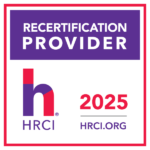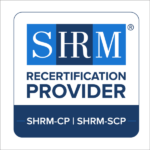Introduction: Beyond Certification Maintenance
Completing your HRCI recertification represents more than compliance—it’s a strategic career milestone that opens new advancement opportunities. This comprehensive guide helps you leverage your renewed certification, professional development portfolio, and expanded network to accelerate career growth and maximize your investment in professional excellence.
Strategic Career Positioning
The Recertification Advantage
Market Differentiation:
– Commitment Demonstration: Sustained professional development investment
– Current Competencies: Up-to-date skills and knowledge validation
– Professional Network: Expanded connections through development activities
– Leadership Readiness: Demonstrated ability to manage long-term goals
Competitive Edge Factors:
– Only 60% complete recertification on time
– 15-20% salary premium for current certification holders
– 3x more likely to be promoted to senior roles
– 50% higher executive opportunity access
Leveraging Your Professional Development Portfolio
Documentation Strategy:
– Competency Mapping: Align learning with career advancement goals
– Achievement Showcase: Quantify learning outcomes and business impact
– Leadership Development: Document management and strategic thinking growth
– Innovation Application: Demonstrate practical application of new knowledge
Portfolio Presentation:
– Executive Summary: 2-page professional development overview
– Competency Matrix: Skills development mapped to career goals
– Impact Metrics: Business outcomes from applied learning
– Future Development Plan: Strategic next-phase goals
Immediate Post-Recertification Actions
30-Day Career Acceleration Plan
Week 1: Portfolio Development
– Compile comprehensive professional development summary
– Create achievement metrics and business impact documentation
– Update LinkedIn profile with recertification and development highlights
– Develop elevator pitch incorporating recent learning and growth
Week 2: Network Activation
– Reconnect with professional development providers and speakers
– Share recertification achievement across professional networks
– Schedule informational interviews with senior professionals
– Join advanced professional associations and leadership groups
Week 3: Market Research
– Conduct salary benchmark analysis with current qualifications
– Research advancement opportunities within current organization
– Explore external market opportunities and requirements
– Identify skill gaps for next career level
Week 4: Strategic Planning
– Develop 1-year and 3-year career advancement timeline
– Create action plan for next certification or professional milestone
– Establish mentoring relationships for career guidance
– Set specific advancement goals and success metrics
Strategic Communication Plan
Internal Positioning (Current Employer):
– Performance Review Integration: Showcase professional development impact
– Leadership Initiative Proposal: Apply new competencies to business challenges
– Mentoring Opportunities: Share knowledge with junior colleagues
– Project Leadership: Volunteer for strategic HR initiatives
External Professional Branding:
– Thought Leadership: Publish articles on professional development insights
– Speaking Opportunities: Present at industry conferences and events
– Professional Association Leadership: Seek board or committee positions
– Media Engagement: Contribute expert commentary on HR trends
Career Advancement Strategies by Certification Level
PHR Professional Advancement
Typical Career Progression:
– Current Role Enhancement: Senior HR Generalist positions
– Specialization Options: Compensation, benefits, or talent acquisition focus
– Team Leadership: HR team or project management roles
– Consultant Transition: Independent HR consulting opportunities
Strategic Development Path:
– Year 1: Leadership and project management training
– Year 2: Specialized competency development (compensation, L&D, etc.)
– Year 3: Strategic business acumen and executive presence
Salary Advancement Targets:
– Enhanced Current Role: 10-15% increase
– Promotion to Senior Role: 20-30% increase
– Specialization Premium: Additional 15-25%
– Management Role: 25-40% increase
SPHR Leadership Advancement
Executive Pathway Opportunities:
– HR Director/VP Roles: Strategic organizational leadership
– Chief People Officer: C-suite executive advancement
– Organizational Development: Culture and change leadership
– Executive Consulting: Senior-level strategic advisory
Strategic Positioning:
– Business Strategy Integration: HR contribution to organizational success
– Executive Presence: Board presentation and stakeholder management
– Change Leadership: Organizational transformation and culture development
– Succession Planning: Leadership development and talent management
Compensation Advancement:
– HR Director Level: $120,000-$180,000
– VP Human Resources: $150,000-$250,000
– Chief People Officer: $200,000-$400,000+
– Executive Consulting: $200-$500+ per hour
GPHR Global Leadership
International Career Opportunities:
– Global HR Leadership: Multinational organization roles
– International Assignment: Expatriate leadership positions
– Global Consulting: Cross-border HR strategy and implementation
– Cultural Integration: Merger and acquisition HR leadership
Global Competency Premium:
– International Role Premium: 25-40% above domestic positions
– Expatriate Packages: Comprehensive benefit and allowance packages
– Global Consulting Rates: 50-75% premium for international expertise
– Executive Mobility: Enhanced access to global leadership opportunities
Building Your Professional Brand
Thought Leadership Development
Content Creation Strategy:
– Industry Publications: Contribute articles to HR magazines and journals
– LinkedIn Thought Leadership: Regular posts on professional development and HR trends
– Conference Speaking: Apply speaking opportunities at industry events
– Podcast Appearances: Share expertise on HR-focused podcasts
Expertise Positioning:
– Professional Development: Share recertification insights and strategies
– HR Innovation: Comment on emerging HR technology and practices
– Workplace Trends: Provide analysis on future of work topics
– Leadership Development: Offer guidance on HR career advancement
Network Expansion and Relationship Building
Strategic Networking:
– Executive Connections: Build relationships with C-suite professionals
– Peer Networks: Connect with HR leaders at similar career levels
– Industry Influencers: Engage with recognized HR thought leaders
– Cross-Functional Relationships: Develop business leader connections
Professional Association Leadership:
– SHRM Chapter Leadership: Board or committee positions
– Specialized Associations: WorldatWork, PIHRA, or industry-specific groups
– Conference Committees: Event planning and program development
– Mentoring Programs: Guide emerging HR professionals
Salary Negotiation and Advancement
Recertification-Based Negotiation Strategy
Preparation Framework:
– Market Research: Comprehensive salary and benefit benchmarking
– Value Documentation: Quantified professional development ROI
– Competency Alignment: New skills mapped to job requirements
– Performance Metrics: Business impact of professional development
Negotiation Approach:
– Investment Emphasis: Highlight continued professional development commitment
– Current Market Value: Present updated salary benchmark data
– Future Potential: Outline career advancement and contribution plans
– Total Compensation: Consider salary, benefits, and professional development support
Promotion Strategy Development
Internal Advancement:
– Succession Planning: Position for identified advancement opportunities
– Cross-Functional Projects: Demonstrate business acumen and collaboration
– Leadership Initiative: Propose and lead strategic HR projects
– Mentoring and Development: Build reputation as talent developer
External Opportunities:
– Strategic Job Search: Target roles leveraging new competencies
– Executive Recruiting: Engage with retained search firms
– Professional Referrals: Leverage expanded network for opportunities
– Market Timing: Strategic timing for maximum advancement potential
Long-Term Career Strategy
5-Year Career Vision
Professional Milestone Planning:
– Next Certification: Additional credentials for specialization or advancement
– Education Enhancement: MBA, Master’s in HR, or specialized degrees
– Board Positions: Corporate or nonprofit board service
– Entrepreneurship: Consulting firm or HR technology startup
Competency Development Roadmap:
– Technical Skills: HR technology, analytics, and automation
– Business Acumen: Financial literacy, strategic planning, and operations
– Leadership Capabilities: Executive presence, change management, and communication
– Global Perspective: International business and cultural competency
Emerging Career Opportunities
Future HR Roles:
– Chief Experience Officer: Employee and customer experience integration
– People Analytics Director: Data-driven HR decision making
– Digital Transformation Leader: Technology-enabled HR innovation
– Workforce Strategy VP: Future of work planning and implementation
Cross-Functional Leadership:
– Chief Operating Officer: Operations leadership with HR expertise
– Strategy and Planning: Organizational development and business strategy
– Learning and Development: Corporate university and executive education
– Diversity and Inclusion: Systematic inclusion and equity leadership
Technology and Innovation Leadership
Digital HR Competency
Technology Leadership:
– HR Technology Strategy: System selection and implementation
– People Analytics: Data-driven HR decision making
– Artificial Intelligence: AI application in HR processes
– Digital Employee Experience: Technology-enabled engagement
Innovation Opportunities:
– HR Technology Consulting: Implementation and optimization services
– Product Development: HR software and solution development
– Research and Development: Academic or corporate research roles
– Startup Leadership: HR technology entrepreneur opportunities
Future Skills Development
Emerging Competencies:
– Data Science: Analytics and statistical analysis
– Design Thinking: Human-centered problem solving
– Agile Methodology: Rapid iteration and adaptation
– Change Management: Organizational transformation leadership
Measuring Career Advancement Success
Key Performance Indicators
Quantitative Metrics:
– Compensation Growth: Salary and total compensation advancement
– Span of Control: Team size and organizational responsibility
– Budget Authority: Financial management and resource allocation
– Revenue Impact: Business contribution and value generation
Qualitative Indicators:
– Industry Recognition: Awards, speaking opportunities, and thought leadership
– Professional Network: Quality and reach of professional relationships
– Mentoring Impact: Success of professionals you’ve developed
– Innovation Contribution: New approaches and solution development
Success Timeline Benchmarks
Year 1 Post-Recertification:
– 10-15% compensation increase or role enhancement
– 2-3 new strategic professional relationships
– 1-2 thought leadership contributions (articles, speaking)
– Clear next-level advancement plan
Year 2-3 Post-Recertification:
– Promotion to next career level or significant role expansion
– Leadership position in professional association
– Recognition as subject matter expert in specialization area
– Mentoring relationships with 2-3 emerging professionals
Long-Term (3-5 Years):
– Executive-level role or senior consulting position
– Industry thought leadership and recognition
– Board or advisory positions
– Next certification or advanced education completion
Risk Management and Career Insurance
Continuous Professional Development
Ongoing Learning Strategy:
– Annual Professional Development Plan: Systematic skill development
– Industry Trend Monitoring: Stay current with emerging HR practices
– Network Maintenance: Regular engagement with professional contacts
– Technology Proficiency: Keep pace with HR technology evolution
Career Resilience Building:
– Diverse Skill Portfolio: Multi-competency capability development
– Industry Diversification: Experience across multiple sectors
– Geographic Flexibility: Regional or global mobility readiness
– Entrepreneurial Skills: Independent consulting or business capability
Market Adaptability
Economic Uncertainty Preparation:
– High-Value Competencies: Focus on recession-resistant HR skills
– Cost Management Expertise: Efficiency and optimization capabilities
– Change Leadership: Crisis management and organizational adaptation
– Technology Integration: Digital transformation and automation
Conclusion: Maximizing Your Professional Investment
HRCI recertification represents the foundation for accelerated career advancement. By strategically leveraging your professional development portfolio, expanded network, and demonstrated commitment to excellence, you can achieve 25-40% compensation growth and significant career advancement within 2-3 years post-recertification.
Career Acceleration Framework:
1. Document and communicate your professional development ROI
2. Activate your network for advancement opportunities
3. Position yourself strategically for leadership roles
4. Continue investing in high-value competency development
5. Measure and adjust your advancement strategy regularly
The most successful HR professionals view recertification as a career catalyst, not just a compliance requirement. With strategic planning and systematic execution, your HRCI investment becomes the foundation for sustained professional growth and industry leadership.
Career Resources and Tools
Professional Development Platforms
- LinkedIn Learning: Professional skill development
- Coursera: University partnerships and certificates
- Harvard Business Review: Executive education programs
- Dale Carnegie: Leadership and communication training
Career Services
- Executive Search Firms: Retained search for senior roles
- Career Coaches: Professional advancement guidance
- Resume Services: Executive-level resume development
- Interview Preparation: Executive interview coaching
Networking Organizations
- SHRM National: Society for Human Resource Management
- WorldatWork: Total rewards professional association
- Conference Board: Business leadership and research
- Young Professionals Groups: Emerging leader networks
Frequently Asked Questions
Q: How soon should I expect career advancement after recertification?
A: Most professionals see advancement opportunities within 6-18 months, with preparation and strategic positioning being key factors.
Q: Should I pursue additional certifications immediately?
A: Focus on leveraging your current recertification first, then pursue additional credentials based on specific career goals.
Q: How do I demonstrate the value of my professional development to employers?
A: Document specific business impacts, cost savings, or process improvements resulting from your new competencies.
Q: What if my current employer doesn’t recognize my recertification achievement?
A: Consider external opportunities where your enhanced qualifications are valued and compensated appropriately.
Q: How long does the career advancement impact of recertification last?
A: The impact compounds over time, with greatest benefits in the first 2-3 years when credentials are most current.
Transform your HRCI recertification from professional maintenance into career acceleration through strategic positioning and systematic advancement planning.


